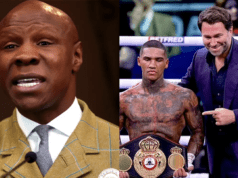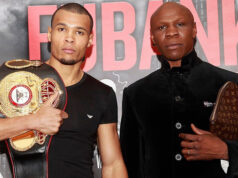President of the BPA (and head of Star Boxing) Talks about the Boxing Promoter’s Association and Their Goals for Boxing: “Boxing Should be Heard From!”
The Boxing Promoter’s Association is less than two years old, but has been working hard to make major strides in the sport. The goal is simple, bring promoters together to advance the sport of boxing by working with one another as opposed to against one another, by improving the sport’s positioning amongst both fans and legislators, and striving to give boxing a larger and more concise, distinctive voice.
What are they up to, what do they plan to do, and how can they really help boxing? ProBoxing-Fans.com chatted with President of the BPA, Joe DeGuardia (who is also President of Star Boxing) about all of this and much more. Take a look at what he has to say, and say hello to the Boxing Promoter’s Association.

Thanks Joe for joining us today… For those that don’t know, can you first tell us a bit about the BPA and what it’s all about?
JD: We formed with promoters right now in the United States, and the purpose of the organization really is the betterment of boxing. Boxing is a sport, boxing is a industry, and the one problem with boxing is that nobody has ever spoken on behalf of the industry and all of the positives that exist. Frankly, when you see newspaper articles and press coverage people like to talk about the ills of the industry, meanwhile there’s tons of good going on with boxing as a sport. It’s a great sport, and we all want to see it flourish and get better and better.
You mentioned working with promoters in the United States, are there plans at all to work with internationally based promoters, or is this primarily designed to address boxing within the U.S.?
JD: Ultimately, right now, there are a lot of issues that are germane to the United States. After we tackle these issues I think that the next step is to look at the world. The reality is that boxing is a world sport. It’s one of the few sports that’s truly a world sport. Certainly, our impact we expect to be felt worldwide.
The BPA was formed in July of 2009. What have you been working on since then?
JD: I’ll put it like this, we’re interested in the forest, and we’re interested in the trees. One of the things that we’re doing is obviously the overall betterment of the sport. Getting the overall betterment of the sport involves many, many different things.
Amongst those are things like medicals, having medical databases so we all are familiar with who the fighters are and their histories, joint cooperation with insurance programs, and a whole host of other things. Internal relations amongst promoters, getting into the disputes and problems, trying to make it so that we’re not battling each other every time and are working towards the good of the sport.
You can talk about federal legislation and that when legislation tries to impact the sport, the people that are involved in the sport are heard, which hasn’t happened in the past. There are sanctioning bodies, and making sure the judges in the fights are competent and can properly score a fight, tackling issues such as boxing getting its fair share of coverage in the newspapers, showing the sport as being credible to the outside and to the world, and getting the positives that exist in the sport out there.
Well, that’s a long laundry list. There’s plenty to be done…
JD: Yea, and that just scratches the surface. The more you look, the more things there are. I watched a press conference earlier this week about MMA, the UFC did it, with the intent of bringing it to New York. At least four times in that press conference, Dana White stated that MMA is as regulated as boxing, and regulated in the same format and fashion as boxing, and he used that to say that MMA should be licensed, that was his argument.
What he was probably referring to were the medical requirements that the state commissions require MMA participants to have, which is similar to boxing. What was misrepresented, is that MMA has nowhere near the regulation that boxing has. For example, with respect to the Muhammad Ali Boxing Reform Act… This regulates boxing but not MMA, and when things like this occur, we do need somebody out there speaking towards it. Boxing doesn’t have that, and that’s one of the things that we also seek to do. Boxing should be heard from.
You’re the president of the BPA and you’re on the Board of Directors, along with Lou DiBella, (DiBella Entertainment) Art Pelullo (Banner Promotions), Jimmy Burchfield (Classic Entertainment and Sports) and Don Chargin (Don Chargin Productions)… Golden Boy Promotions recently just joined the fold, and all told there are about 30 promotional companies involved. It’s a great group, but has there been any resistance from any other organizations or individuals not involved with the BPA?
JD: No, first, from the likes of Association of Boxing Commissions, absolutely not. I was down with their meeting in New Orleans this past summer on behalf of the BPA, and we’re going to start doing a lot of joint operation work as an industry. Same thing with trying to speak with the sanctioning bodies and have them start doing things more conducive to the industry and credibility. So from that front, not at all.
In terms of other promoters who didn’t join, well, almost universally every one of them talks positively in respect to the things that we’re doing, even if for whatever reasons they might not have joined. Frankly, from a promoters standpoint, there aren’t many that haven’t joined. It’s a very strong and present group. We keep getting more and more people looking to join on, and I know this week we sent out a bunch of membership applications to other companies who wanted to get on board. We have a lot of interest from international companies, and again, when the time is right, we may open it up to that, although not yet.
So tell me a little bit about the meeting with Senator John McCain, and what specifically is on the docket for that session? And can you talk a bit about the Muhammad Ali Act, which you mentioned already, and what you think needs to be improved, strengthened or changed there?
JD: Well, honestly, I’d like to leave that for another discussion. From the perspective of whether we’re going to meet with Senator McCain, the reality is that we expect to meet, and be heard from, and express our voice, on all different fronts, including state athletic commissions, state regulations and laws, and so forth.
There is a law right now in most states that has a tax on boxing shows. An extra tax, in addition to a regular tax… an amusement tax against boxing shows. Why does that occur? Why is boxing different from a concert let’s say, which doesn’t get that kind of tax? These are things we want to look at. Ultimately if that stays, with the economy, they need money, that’s fine. But there has to be an understanding of what boxing does provide. We provide good monies to states with events, bringing in people that get hotel rooms, from just the participants and fighters, let alone fans. There are a lot of things that boxing does for state economies and for people, and we want that to be heard and be known.
The Ali Act exists right now, and other federal legislations out there, which regulate our sport in certain manners, the same way that the states regulate our sport. One thing that people might not be aware of is that boxing promoters have to disclose to the fighters how much revenue comes in from a fight. That’s one of the things in the Ali Act. The reality is that, more than any other sport, boxing is regulated. More than any other sport, we are an open book, we show our numbers, we show our profits, the revenue streams. All of those types of things.
It would be a good thing when the corporate world starts to realize that boxing as a sport, is such a clean sport, and in many states and jurisdictions is run properly, and is even overly fair to the athletes. The athletes in boxing make much more money per dollar amount when you split up the pie than any other sport. When you look at the NFL, MLB, soccer, any of those sports, the total revenue pie and how it’s split between the owners, which are the promoters in boxing, and the athletes, in boxing, the athletes get much more.
Well, and with you having mentioned mixed martial arts, I’ve crunched some of those numbers in the past myself, and the fighters in MMA certainly don’t get much of the pie.
JD: Correct. And in boxing, that’s the number 1 overall cost, the participants. And those are strong things for boxing which unfortunately the public isn’t really aware of. Once that happens, and corporations realize how clean the sport actually is, and how beneficial the sport actually is, we think it will keep rising in stature. Those types of things, showing the credibility of the sport, showing the benefits and values of the sport, showing the benefits to people outside of the sport… all of those things will make the sport rise even greater.
That will enable the people in the sport to earn money. And that goes to the fighters and everyone else. Once you start earning money in the sport, things like pensions, things like health benefits, and all of those types of things that other sports have that we unfortunately don’t have right now, can start to be addressed.
Is there much talk these days within the BPA or elsewhere regarding a national boxing commission, which has been talked of here and there in the past, being formed down the road?
JD: There has been talk, and those of us that are in the sport are opposed to that. Our position is that the sport needs to be regulated from within. You have to know the sport, the dynamics of the sport… we need to take care of our own house. We think that when we take care of our house, it will be seen that we can run it better than anybody.
So as you get more and more promoters with the BPA, are you guys basically trying to form your own de facto “national commission”, which isn’t federally run, but has a new universal set of standards, guidelines, bylaws and regulations?
JD: Well, the more that we regulate the sport and the more that we have a system in place that is a credible, fair and just system, the better our sport will be. Certainly, other sports aspire to the same type of thing. You have the New York Giants, the New York Jets, the Raiders, the Broncos… a whole country of teams, all with athletes. But you also have the NFL, which regulates the sport, which settles disputes, which handles issues, which sets up rules and regulations and bylaws, all the things that they strive to live by. The same thing occurs in baseball, in the NBA, and so forth. [Editor’s Note: Of course, the current labor issues in the NFL and NBA are something that boxing shouldn’t strive for…] So why shouldn’t boxing have an entity that looks out for the sport?
So yes, ultimately that would be a good thing, if there was a dispute if the two sides could go to an arbitrator within the confines of this association, and so on. You could regulate these types of things, and when you have somebody that operates not in the good interest in the sport, and operates in a manner detrimental to the sport, we can take action. Not just that a state takes action, but the entity of the sport takes action. Let’s face it, the people that are going to look out for the sport are the people that are living in the sport. We live this sport. We live it, we support it, and we want to see it grow and operate in the best manner possible, so that we can flourish.
Well alright you mentioned the sanctioning bodies, and I wanted to ask you about all of those issues.. rankings… belts… sanctioning bodies. Again, is there any talk that hey if we get more people on board here, we can make our own rankings or our own belts, and forget the sanctioning bodies, or anything like that?
JD: Well, there are a lot of things in boxing that we would strive to look at making changes with. With that being said, obviously there are a lot of different viewpoints and differing opinions on the way that it should occur…..
Well one of the ideas that has been floated out there is something along the lines of the regular season poll in college football, where journalists and other individuals involved in the sport get together and vote on who they think is the best. What do you think about that kind of system, or what other potential ideas could you see?
JD: Well, I have my own views, and somebody else sitting else to me might have a differing view. The whole real value is that we’re able to sit down together and collectively discuss it, and when we come to a conclusion as to what we feel is the proper way to go forward, that we agree to go forward in that way based upon our votes. That’s really one of the major values of this association.
So the particulars of an issue such as independent ratings or anything else, those are issues that we will tackle at some point in time in the future. Those are issues that really need to be flushed out, because there are so many different opinions. I don’t want to be presumptuous to speak on behalf of the entire group on issues that we really haven’t flushed out thoroughly. And there are more issues like that too. From my personal perspective, I love the idea that when you say “world champion”, the whole world knows who you’re talking about. To me that’s a good thing, and to ultimately get to that, well, we’ll have to see.
The real value is that we start to look at these things, and there is somebody looking at these things from the perspective of the sport. Not a personal perspective. It may be in my interest to have a particular champion, or somebody else’s interests to have a particular champion, but what’s in the interest of the entire sport? That’s what we want to start looking at. Sometimes you have to have the whole bigger than the individual parts, and that’s what we need to do and work towards.
Alright, well if you and the BPA had a big red button, and you could push it and could change any one thing right now about the sport of boxing, what would it be?
JD: Again, you’d get a lot of divergent answers…
Well, for yourself then…
JD: For myself… I’d say that we are taking that step right now. That is, to have somebody look out for the sport as a whole. I think that the individual aspects of the sport need to be tackled by somebody looking out for the sport as a whole, and I think we’re pushing that button right now.
Now, what about the fans that want to get involved? Boxing has a passionate fan base and everyone always talks about making positive changes. What can the fans do to get involved and help improve the sport, whether on a grassroots level or even a much grander scale?
JD: Well, look, first they can support our efforts, the promoters that are members of the Boxing Promoters Association. Look, fans are powerful… fans can be powerful. The more fans that are speaking out will benefit the sport. In terms of everything we have been speaking about, it comes to a forefront eventually. This is the one sport, and it’s an interesting thing… in many other sports what drives the sport is you know a corporation saying “Ok we’re going to put some money into this sport, and we’re going to sponsor this particular sport.”
In boxing, our money is not made by a corporation going out there and saying we’re going to sponsor this sport, throw money into this sport, and subsidize this sport. That doesn’t happen in boxing. Boxing exists because fans pay money to come and watch the fights, or pay money to watch the fights on television, or pay to get a subscription to HBO. We actually generate that money, and that’s a big difference. Ultimately what will happen is that the fans should let the television networks know, the sponsors, that they follow boxing, that they want to see their product associated with boxing.
One thing I often talk about is when fans complain that they don’t like this crappy PPV card or that one, to just not buy the fight, and the crappy PPVs won’t be put out there anymore…
JD: Yea, or they can get involved also from the perspective of regular television, you know, writing to NBC and letting them know that hey it’s great we see football all the time, but why don’t we see boxing? Why don’t we have boxing on television? Let them know that they want to see boxing. Let sponsors know they’re big boxing fans and how come we don’t see you supporting boxing? Those are the types of things that can mobilize companies and get them to support the sport, and when they support the sport, obviously you get better fights.










